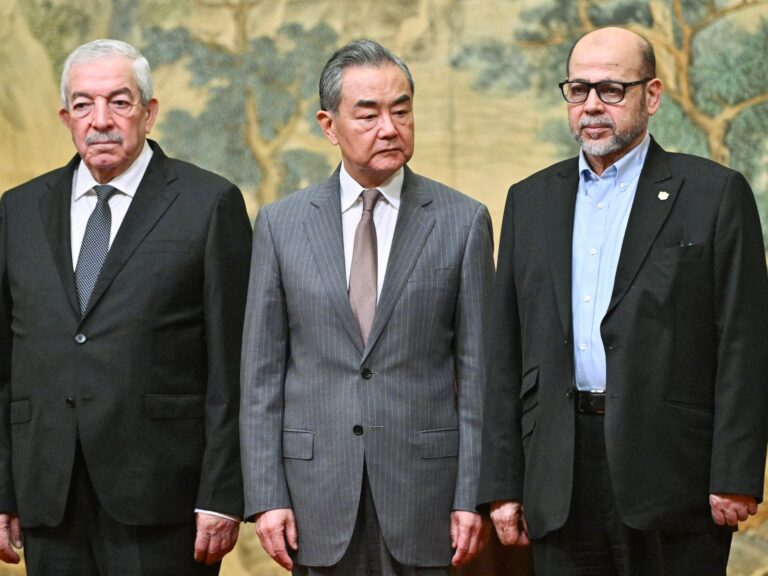Beijing says the factions have agreed to form a “transitional government of national reconciliation.”
The Palestinian factions signed a “national unity” agreement aimed at ensuring Palestinian control over the Gaza Strip after Israel’s war on the strip ends.
Chinese Foreign Minister Wang Yi said the agreement, signed in China on Tuesday after three days of intensive negotiations, lays the foundation for an “Interim National Reconciliation Government” to govern post-war Gaza. The agreement was signed by longtime rivals Hamas and Fatah, as well as 12 other Palestinian groups.
“Today we sign an agreement for national unity and say that the path to completing this journey is national unity,” senior Hamas official Mousa Abu Marzouk told a news conference in Beijing.
Stopping Israeli control of Gaza
Mustafa Barghouti, secretary-general of the Palestinian National Initiative, one of the 14 factions that signed the deal, told Al Jazeera the agreement went “much further” than any reached in recent years.
He said the four key elements were the establishment of an interim national unity government, the formation of a united Palestinian leadership ahead of future elections, free elections for a new Palestinian National Council and a general declaration of unity amid continuing Israeli aggression.
He said moving toward a unity government was particularly important because it would “thwart Israeli efforts to create any kind of partnership that goes against Palestinian interests.”
A reconciliation between Hamas and Fatah would mark a major turning point in Palestinian relations. The two main parties in the Palestinian territories have been at odds since the conflict erupted in 2006, after Hamas took control of the Gaza Strip.
“We are at a historic crossroads. The people are rising up to fight,” Abu Marzouk said, according to CNN.
Hamas, which led the Oct. 7 attack on Israel, advocates armed resistance to the Israeli occupation.
Fatah controls the Palestinian Authority and exercises administrative control over parts of the occupied West Bank. It supports peaceful negotiations towards the establishment of a Palestinian state.
“There is no other way than unity”
Multiple attempts at reconciliation between the two sides have failed, but as the war has dragged on, calls for reconciliation have grown and Israel and its allies, including the United States, have been discussing who should rule the exclave once the fighting ends.
Israel strongly opposes any role for Hamas and has signaled its intention to maintain control through the military for the time being.
Barghouti said the war in Gaza was the “main factor” that motivated the Palestinians to set aside their differences.
“There is now no other way forward than for Palestinians to unite and fight together against this terrible injustice,” he said.
“The most important thing now is not just to sign the agreement but to implement it.”
China, which has sought to act as a mediator in the conflict, previously hosted Fatah and Hamas in April.
During the meeting, the two leaders “expressed the political will to achieve reconciliation through dialogue and consultation” and progress was made on “a number of concrete issues,” Chinese Foreign Ministry spokesman Lin Jian said at the time.
The latest meeting was attended by Hamas political leader Ismael Haniyeh and Fatah deputy leader Mahmoud al-Aruol.
After signing what was called the “Beijing Declaration,” Chinese Foreign Minister Wang Yi said, “Reconciliation is an internal issue for all Palestinian factions, but at the same time it cannot be achieved without the support of the international community.”
China has historically been sympathetic to the Palestinian cause and has supported a two-state solution to the Israeli-Palestinian conflict.
Chinese President Xi Jinping has called for an “international peace conference” to end the war.

